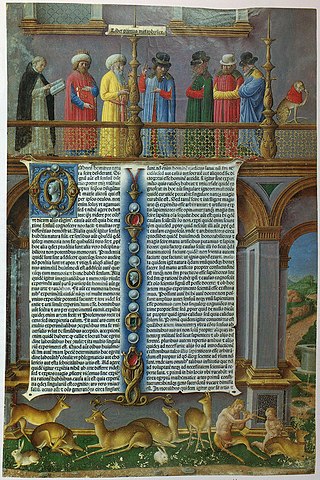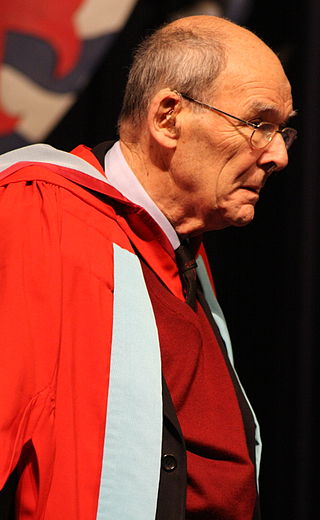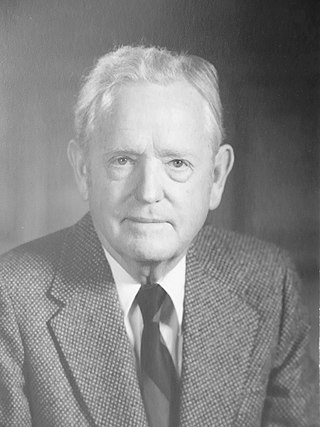In analytic philosophy, anti-realism is the position that the truth of a statement rests on its demonstrability through internal logic mechanisms, such as the context principle or intuitionistic logic, in direct opposition to the realist notion that the truth of a statement rests on its correspondence to an external, independent reality. In anti-realism, this external reality is hypothetical and is not assumed.

Existence is the state of having being or reality in contrast to nonexistence and nonbeing. Existence is often contrasted with essence: the essence of an entity is its essential features or qualities, which can be understood even if one does not know whether the entity exists.

Metaphysics is the branch of philosophy that examines the basic structure of reality. It is traditionally seen as the study of mind-independent features of the world, but some theorists view it as an inquiry into the fundamental categories of human understanding. Some philosophers, including Aristotle, designate metaphysics as first philosophy to suggest that it is more fundamental than other forms of philosophical inquiry.

In metaphysics, nominalism is the view that universals and abstract objects do not actually exist other than being merely names or labels. There are two main versions of nominalism. One denies the existence of universals –that which can be instantiated or exemplified by many particular things. The other version specifically denies the existence of abstract objects as such –objects that do not exist in space and time.
Ontology is the philosophical study of being. It is traditionally understood as the subdiscipline of metaphysics focused on the most general features of reality. As one of the most fundamental concepts, being encompasses all of reality and every entity within it. To articulate the basic structure of being, ontology examines what all things have in common. It also investigates how they can be grouped into basic types, such as the categories of particulars and universals. Particulars are unique, non-repeatable entities, like the person Socrates. Universals are general, repeatable entities, like the color green. Another contrast is between concrete objects existing in space and time, like a tree, and abstract objects existing outside space and time, like the number 7. Systems of categories aim to provide a comprehensive inventory of reality, employing categories such as substance, property, relation, state of affairs, and event.
In metaphysics, particulars or individuals are usually contrasted with universals. Universals concern features that can be exemplified by various different particulars. Particulars are often seen as concrete, spatiotemporal entities as opposed to abstract entities, such as properties or numbers. There are, however, theories of abstract particulars or tropes. For example, Socrates is a particular. Redness, by contrast, is not a particular, because it is abstract and multiply instantiated . In the nominalist view, everything is particular. A universal at each moment in time, from the point of view of an observer, is a set of particulars.

The problem of universals is an ancient question from metaphysics that has inspired a range of philosophical topics and disputes: "Should the properties an object has in common with other objects, such as color and shape, be considered to exist beyond those objects? And if a property exists separately from objects, what is the nature of that existence?"
Substance theory, or substance–attribute theory, is an ontological theory positing that objects are constituted each by a substance and properties borne by the substance but distinct from it. In this role, a substance can be referred to as a substratum or a thing-in-itself. Substances are particulars that are ontologically independent: they are able to exist all by themselves. Another defining feature often attributed to substances is their ability to undergo changes. Changes involve something existing before, during and after the change. They can be described in terms of a persisting substance gaining or losing properties. Attributes or properties, on the other hand, are entities that can be exemplified by substances. Properties characterize their bearers; they express what their bearer is like.
Essence has various meanings and uses for different thinkers and in different contexts. It is used in philosophy and theology as a designation for the property or set of properties or attributes that make an entity the entity it is or, expressed negatively, without which it would lose its identity. Essence is contrasted with accident, which is a property or attribute the entity has accidentally or contingently, but upon which its identity does not depend.
In logic and philosophy, a property is a characteristic of an object; a red object is said to have the property of redness. The property may be considered a form of object in its own right, able to possess other properties. A property, however, differs from individual objects in that it may be instantiated, and often in more than one object. It differs from the logical/mathematical concept of class by not having any concept of extensionality, and from the philosophical concept of class in that a property is considered to be distinct from the objects which possess it. Understanding how different individual entities can in some sense have some of the same properties is the basis of the problem of universals.
In philosophy and the arts, a fundamental distinction is between things that are abstract and things that are concrete. While there is no general consensus as to how to precisely define the two, examples include that things like numbers, sets, and ideas are abstract objects, while plants, dogs, and planets are concrete objects. Popular suggestions for a definition include that the distinction between concreteness versus abstractness is, respectively: between (1) existence inside versus outside space-time; (2) having causes and effects versus not; 3) being related, in metaphysics, to particulars versus universals; and (4) belonging to either the physical versus the mental realm. Another view is that it is the distinction between contingent existence versus necessary existence; however, philosophers differ on which type of existence here defines abstractness, as opposed to concreteness. Despite this diversity of views, there is broad agreement concerning most objects as to whether they are abstract or concrete, such that most interpretations agree, for example, that rocks are concrete objects while numbers are abstract objects.

In metaphysics, conceptualism is a theory that explains universality of particulars as conceptualized frameworks situated within the thinking mind. Intermediate between nominalism and realism, the conceptualist view approaches the metaphysical concept of universals from a perspective that denies their presence in particulars outside the mind's perception of them. Conceptualism is anti-realist about abstract objects, just like immanent realism is.
Philosophical realism—usually not treated as a position of its own but as a stance towards other subject matters— is the view that a certain kind of thing has mind-independent existence, i.e. that it exists even in the absence of any mind perceiving it or that its existence is not just a mere appearance in the eye of the beholder. This includes a number of positions within epistemology and metaphysics which express that a given thing instead exists independently of knowledge, thought, or understanding. This can apply to items such as the physical world, the past and future, other minds, and the self, though may also apply less directly to things such as universals, mathematical truths, moral truths, and thought itself. However, realism may also include various positions which instead reject metaphysical treatments of reality altogether.

David Malet Armstrong, often D. M. Armstrong, was an Australian philosopher. He is well known for his work on metaphysics and the philosophy of mind, and for his defence of a factualist ontology, a functionalist theory of the mind, an externalist epistemology, and a necessitarian conception of the laws of nature.

Platonism is the philosophy of Plato and philosophical systems closely derived from it, though contemporary Platonists do not necessarily accept all doctrines of Plato. Platonism has had a profound effect on Western thought. At the most fundamental level, Platonism affirms the existence of abstract objects, which are asserted to exist in a third realm distinct from both the sensible external world and from the internal world of consciousness, and is the opposite of nominalism. This can apply to properties, types, propositions, meanings, numbers, sets, truth values, and so on. Philosophers who affirm the existence of abstract objects are sometimes called Platonists; those who deny their existence are sometimes called nominalists. The terms "Platonism" and "nominalism" also have established senses in the history of philosophy. They denote positions that have little to do with the modern notion of an abstract object.
Trope denotes figurative and metaphorical language and one which has been used in various technical senses. The term trope derives from the Greek τρόπος (tropos), "a turn, a change", related to the root of the verb τρέπειν (trepein), "to turn, to direct, to alter, to change"; this means that the term is used metaphorically to denote, among other things, metaphorical language.

Moderate realism is a position in the debate on the metaphysics of universals associated with the hylomorphic substance theory of Aristotle. There is no separate realm in which universals exist, nor do they really exist within particulars as universals, but rather universals really exist within particulars as particularised, and multiplied.
In philosophy and specifically metaphysics, the theory of Forms, theory of Ideas, Platonic idealism, or Platonic realism is a theory widely credited to the Classical Greek philosopher Plato. The theory suggests that the physical world is not as real or true as "Forms". According to this theory, Forms—conventionally capitalized and also commonly translated as "Ideas"—are the non-physical, timeless, absolute, and unchangeable essences of all things, which objects and matter in the physical world merely imitate, resemble, or participate in. Plato speaks of these entities only through the characters in his dialogues who sometimes suggest that these Forms are the only objects of study that can provide knowledge.

Donald Cary Williams, usually cited as D. C. Williams, was an American philosopher and a professor at both the University of California Los Angeles and at Harvard University.

Predication in philosophy refers to an act of judgement where one term is subsumed under another. A comprehensive conceptualization describes it as the understanding of the relation expressed by a predicative structure primordially through the opposition between particular and general or the one and the many.









